- Home
- Franz Kafka
Collected Stories Page 47
Collected Stories Read online
Page 47
Translated by Tania and James Stern
The Test
I AM a servant, but there is no work for me. I am timid and don’t push myself to the fore, indeed I don’t even push myself into line with the others, but that is only one reason for my nonemployment, it’s even possible that it has nothing to do with my nonemployment, in any case the main thing is that I am not called upon to serve, others have been called yet they have not tried harder than I, indeed perhaps they have not even felt the desire to be called, whereas I, at least sometimes, have felt it very strongly.
So I lie on the pallet in the servants’ hall, stare at the beams in the ceiling, fall asleep, wake up, and promptly fall asleep again. Occasionally I walk over to the tavern where they sell a sour beer, occasionally I have even poured away a glass in disgust, but at other times I drink it. I like sitting there because from behind the closed little window, without the possibility of being discovered, I can see across to the windows of our house. Not that one sees very much there, to my knowledge only the windows of the corridors look out on the street, and moreover not even those of the corridors leading to my employers’ apartments. But it is also possible that I am mistaken; someone, without my having asked him, once said so, and the general impression of this house front confirms this. Only rarely are the windows opened, and when this does occur it is done by a servant who may lean against the balustrade to look down for a while. It follows therefore that these are corridors where he cannot be taken by surprise. As a matter of fact I am not personally acquainted with these servants; those who are permanently employed upstairs sleep elsewhere, not in my room.
Once when I arrived at the tavern, a guest was sitting at my observation post. I did not dare look at him closely and was about to turn around in the door and leave. The guest, however, called me over, and it turned out that he too was a servant whom I had once seen somewhere before, but without having spoken to him.
‘Why do you want to run away? Sit down and have a drink! I’ll pay.’ So I sat down. He asked me several things, but I couldn’t answer, indeed I didn’t even understand his questions. So I said: ‘Perhaps you are sorry now that you invited me, so I’d better go,’ and I was about to get up. But he stretched his hand out over the table and pressed me down. ‘Stay,’ he said, ‘that was only a test. He who does not answer the questions has passed the test.’
Translated by Tania and James Stern
The Vulture
A VULTURE was hacking at my feet. It had already torn my boots and stockings to shreds, now it was hacking at the feet themselves. Again and again it struck at them, then circled several times restlessly around me, then returned to continue its work. A gentleman passed by, looked on for a while, then asked me why I suffered the vulture. ‘I’m helpless,’ I said. ‘When it came and began to attack me, I of course tried to drive it away, even to strangle it, but these animals are very strong, it was about to spring at my face, but I preferred to sacrifice my feet. Now they are almost torn to bits.’ ‘Fancy letting yourself be tortured like this!’ said the gentleman. ‘One shot and that’s the end of the vulture.’ ‘Really?’ I said. ‘And would you do that?’ ‘With pleasure,’ said the gentleman, ‘I’ve only got to go home and get my gun. Could you wait another half-hour?’ ‘I’m not sure about that,’ said I, and stood for a moment rigid with pain. Then I said: ‘Do try it in any case, please.’ ‘Very well,’ said the gentleman, ‘I’ll be as quick as I can.’ During this conversation the vulture had been calmly listening, letting its eye rove between me and the gentleman. Now I realized that it had understood everything; it took wing, leaned far back to gain impetus, and then, like a javelin thrower, thrust its beak through my mouth, deep into me. Falling back, I was relieved to feel him drowning irretrievably in my blood, which was filling every depth, flooding every shore.
Translated by Tania and James Stern
The Helmsman
‘AM I NOT the helmsman here?’ I called out. ‘You?’ asked a tall, dark man and passed his hands over his eyes as though to banish a dream. I had been standing at the helm in the dark night, a feeble lantern burning over my head, and now this man had come and tried to push me aside. And as I would not yield, he put his foot on my chest and slowly crushed me while I still clung to the hub of the helm, wrenching it around in falling. But the man seized it, pulled it back in place, and pushed me away. I soon collected myself, however, ran to the hatchway which gave on to the mess quarters, and cried out: ‘Men! Comrades! Come here, quick! A stranger has driven me away from the helm!’ Slowly they came up, climbing the companion ladder, tired, swaying, powerful figures. ‘Am I the helmsman?’ I asked. They nodded, but they had eyes only for the stranger, stood around him in a semicircle, and when, in a commanding voice, he said: ‘Don’t disturb me!’ they gathered together, nodded at me, and withdrew down the companion ladder. What kind of people are these? Do they ever think, or do they only shuffle pointlessly over the earth?
Translated by Tania and James Stern
The Top
A CERTAIN PHILOSOPHER used to hang about wherever children were at play. And whenever he saw a boy with a top, he would lie in wait. As soon as the top began to spin the philosopher went in pursuit and tried to catch it. He was not perturbed when the children noisily protested and tried to keep him away from their toy; so long as he could catch the top while it was still spinning, he was happy, but only for a moment; then he threw it to the ground and walked away. For he believed that the understanding of any detail, that of a spinning top, for instance, was sufficient for the understanding of all things. For this reason he did not busy himself with great problems, it seemed to him uneconomical. Once the smallest detail was understood, then everything was understood, which was why he busied himself only with the spinning top. And whenever preparations were being made for the spinning of the top, he hoped that this time it would succeed: as soon as the top began to spin and he was running breathlessly after it, the hope would turn to certainty, but when he held the silly piece of wood in his hand, he felt nauseated. The screaming of the children, which hitherto he had not heard and which now suddenly pierced his ears, chased him away, and he tottered like a top under a clumsy whip.
Translated by Tania and James Stern
Hands
MY TWO HANDS began a fight. They slammed the book I had been reading and thrust it aside so that it should not be in the way. Me they saluted, and appointed me referee. And an instant later they had locked fingers with each other and were already rushing away over the edge of the table, now to the right, now to the left, according to which of them was bringing most pressure to bear on the other. I never turned my gaze from them. If they are my hands, I must referee fairly, otherwise I shall bring down on myself the agonies of a wrong decision. But my function is not easy, in the darkness between the palms of the hands various holds are brought into play that I must not let pass unnoticed, and so I press my chin on the table and now nothing escapes me. All my life long I have made a favorite of the right, without meaning the left any harm. If the left had ever said anything, indulgent and just as I am, I should at once have put a stop to the abuse. But it never grumbled, it hung down from me, and while, say, the right was raising my hat in the street, the left was timidly fumbling down my thigh. That was a bad way of preparing for the struggle that is now going on. How in the long run, left wrist, will you resist the pressure of this powerful right hand? How maintain your girlish finger’s stand in the grip of the five others? This seems to me to be no longer a fight, but the natural end of the left hand. Even now it has been pushed to the extreme left rim of the table, and the right is pounding regularly up and down on it like the piston of an engine. If, confronted with this misery, I had not got the saving idea that these are my own hands and that with a slight jerk I can pull them away from each other and so put an end to the fight and the misery – if I had not got this idea, the left hand would have been broken out of the wrist, would have been flung from the table, and then the right, in the
wild recklessness of knowing itself the victor, might have leapt, like five-headed Cerberus, straight into my attentive face. Instead, the two now lie one on top of the other, the right stroking the back of the left, and I, dishonest referee, nod in approval.
Translated by Eithne Wilkins and Ernst Kaiser
A Little Fable
‘ALAS,’ said the mouse, ‘the world is growing smaller every day. At the beginning it was so big that I was afraid, I kept running and running, and I was glad when at last I saw walls far away to the right and left, but these long walls have narrowed so quickly that I am in the last chamber already, and there in the corner stands the trap that I must run into.’ ‘You only need to change your direction,’ said the cat, and ate it up.
Translated by Willa and Edwin Muir
Isabella
IT IS ISABELLA, the dapple-gray, the old horse, I should never have recognized her in the crowd, she has become a lady, we met only recently in a garden, at a charity fěte. There is a little copse there, standing somewhat apart and enclosing a cool, shaded lawn, which is crossed this way and that by several narrow paths, and at times it is a very pleasant place to be. I used to know the garden in the old days, and when I was tired of the fěte, I turned aside into this copse. Scarcely had I stepped among the trees when I saw a tall lady coming toward me from the other side; I was almost dismayed at her tallness, there was nobody else nearby whom I could have compared her with, but I was sure I knew no woman whom this one would not have overtopped by several heads – in my first amazement I even thought by innumerable heads. But as I drew nearer, I was quickly reassured. My old friend Isabella! ‘Well, and how did you get out of your stable?’ ‘Oh, that wasn’t difficult, the fact is I am really kept on only for old times’ sake, my day is over. When I explain to my master that instead of standing in the stable, being no use to anyone, I want to see a little of the world now too, while I can, as long as I have the strength for it – when I explain this to my master, he understands me, he looks out some of the late mistress’s clothes, helps me to dress and then sends me off out with his best wishes.’ ‘How beautiful you are!’ I said, not quite sincerely, but also not altogether dishonestly.
Translated by Eithne Wilkins and Ernst Kaiser
Home-coming
I HAVE RETURNED, I have passed under the arch and am looking around. It’s my father’s old yard. The puddle in the middle. Old, useless tools, jumbled together, block the way to the attic stairs. The cat lurks on the banister. A torn piece of cloth, once wound around a stick in a game, flutters in the breeze. I have arrived. Who is going to receive me? Who is waiting behind the kitchen door? Smoke is rising from the chimney, coffee is being made for supper. Do you feel you belong, do you feel at home? I don’t know, I feel most uncertain. My father’s house it is, but each object stands cold beside the next, as though preoccupied with its own affairs, which I have partly forgotten, partly never known. What use can I be to them, what do I mean to them, even though I am the son of my father, the old farmer? And I don’t dare knock at the kitchen door, I only listen from a distance, I only listen from a distance, standing up, in such a way that I cannot be taken by surprise as an eavesdropper. And since I am listening from a distance, I hear nothing but a faint striking of the clock passing over from childhood days, but perhaps I only think I hear it. Whatever else is going on in the kitchen is the secret of those sitting there, a secret they are keeping from me. The longer one hesitates before the door, the more estranged one becomes. What would happen if someone were to open the door now and ask me a question? Would not I myself then behave like one who wants to keep his secret?
Translated by Tania and James Stern
A Chinese Puzzle
ONCE THERE WAS a Chinese puzzle, a cheap simple toy, not much bigger than a pocket-watch and without any sort of surprising contrivances. Cut into the flat wood, which was painted reddish-brown, there were some blue labyrinthine paths, which all led into a little hole. The ball, which was also blue, had to be got into one of the paths by means of tilting and shaking the box, and then into the hole. Once the ball was in the hole, the game was over, and if one wanted to start all over again, one had first to shake the ball out of the hole. The whole thing was covered over with a strong, convex glass, one could put the puzzle in one’s pocket and carry it about with one, and wherever one was, one could take it out and play with it.
If the ball was unemployed, it spent most of the time strolling to and fro, its hands clasped behind its back, on the plateau, avoiding the paths. It held the view that it was quite enough bothered with the paths during the game and that it had every right to recuperate on the open plain when no game was going on. Sometimes it would look up at the vaulted glass, but merely out of habit and quite without any intention of trying to make out anything up there. It had a rather straddling gait and maintained that it was not made for those narrow paths. That was partly true, for indeed the paths could hardly contain it, but it was also untrue, for the fact was that it was very carefully made to fit the width of the paths exactly, but the paths were certainly not meant to be comfortable for it, or else it would not have been a puzzle at all.
Translated by Eithne Wilkins and Ernst Kaiser
The Departure
I ORDERED my horse to be brought from the stables. The servant did not understand my orders. So I went to the stables myself, saddled my horse, and mounted. In the distance I heard the sound of a trumpet, and I asked the servant what it meant. He knew nothing and had heard nothing. At the gate he stopped me and asked: ‘Where is the master going?’ I don’t know,’ I said, ‘just out of here, just out of here. Out of here, nothing else, it’s the only way I can reach my goal.’ ‘So you know your goal?’ he asked. ‘Yes,’ I replied, ‘I’ve just told you. Out of here – that’s my goal.’
Translated by Tanta and James Stern
Advocates
I WAS not at all certain whether I had any advocates, I could not find out anything definite about it, every face was unfriendly, most people who came toward me and whom I kept meeting in the corridors looked like fat old women; they had huge blue-and-white striped aprons covering their entire bodies, kept stroking their stomachs and swaying awkwardly to and fro. I could not even find out whether we were in a law court. Some facts spoke for it, others against. What reminded me of a law court more than all the details was a droning noise which could be heard incessantly in the distance; one could not tell from which direction it came, it filled every room to such an extent that one had to assume it came from everywhere, or, what seemed more likely, that just the place where one happened to be standing was the very place where the droning originated, but this was probably an illusion, for it came from a distance. These corridors, narrow and austerely vaulted, turning in gradual curves with high, sparsely decorated doors, seemed to have been created specially for profound silence; they were the corridors of a museum or a library. Yet if it were not a law court, why was I searching for an advocate here? Because I was searching for an advocate everywhere; he is needed everywhere, if anything less in court than elsewhere, for a court, one assumes, passes judgment according to the law. If one were to assume that this was being done unfairly or frivolously, then life would not be possible; one must have confidence that the court allows the majesty of the law its full scope, for this is its sole duty. Within the law all is accusation, advocacy, and verdict; any interference by an individual here would be a crime. It is different, however, in the case of the verdict itself; this is based on inquiries being made here and there, from relatives and strangers, from friends and enemies, in the family and public life, in town and village – in short, everywhere. Here it is most necessary to have advocates, advocates galore, the best possible advocates, one next to the other, a living wall, for advocates are by nature hard to set in motion; the plaintiffs, however, those sly foxes, those slinking weasels, those little mice, they slip through the tiniest gaps, scuttle through the legs of the advocates. So look out! That’s why I am here, I’m c
ollecting advocates. But I have not found any as yet, only those old women keep on coming and going; if I were not on my search it would put me to sleep. I’m not in the right place – alas, I cannot rid myself of the feeling that I’m not in the right place. I ought to be in a place where all kinds of people meet, from various parts of the country, from every class, every profession, of all ages; I ought to have an opportunity of choosing carefully out of a crowd those who are kind, those who are able, and those who have an eye for me. Perhaps the most suitable place for this would be a huge fairground; instead of which I am hanging about in these corridors where only these old women are to be seen, and not even many of them, and always the same ones, and even those few will not let themselves be cornered, despite their slowness; they slip away from me, float about like rain clouds, and are completely absorbed by unknown activities. Why is it then that I run headlong into a house without reading the sign over the door, promptly find myself in these corridors, and settle here with such obstinacy that I cannot even remember ever having been in front of the house, ever having run up the stairs! But back I cannot go, this waste of time, this admission of having been on the wrong track would be unbearable for me. What? Run downstairs in this brief, hurried life accompanied as it is by that impatient droning? Impossible. The time allotted to you is so short that if you lose one second you have already lost your whole life, for it is no longer, it is always just as long as the time you lose. So if you have started out on a walk, continue it whatever happens; you can only gain, you run no risk, in the end you may fall over a precipice perhaps, but had you turned back after the first steps and run downstairs you would have fallen at once – and not perhaps, but for certain. So if you find nothing in the corridors open the doors, if you find nothing behind these doors there are more floors, and if you find nothing up there, don’t worry, just leap up another flight of stairs. As long as you don’t stop climbing, the stairs won’t end, under your climbing feet they will go on growing upwards.

 Diaries of Franz Kafka
Diaries of Franz Kafka Metamorphosis and Other Stories
Metamorphosis and Other Stories The Castle: A New Translation Based on the Restored Text
The Castle: A New Translation Based on the Restored Text The Complete Stories
The Complete Stories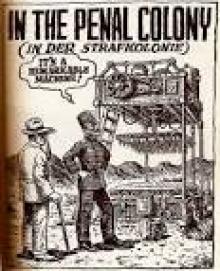 In the Penal Colony
In the Penal Colony The Trial
The Trial Amerika
Amerika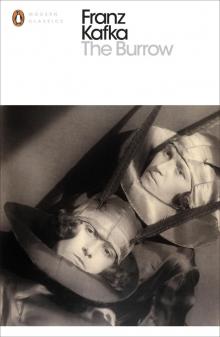 The Burrow: Posthumously Published Short Fiction
The Burrow: Posthumously Published Short Fiction Sons
Sons Letters to Milena
Letters to Milena Investigations of a Dog: And Other Creatures
Investigations of a Dog: And Other Creatures Collected Stories
Collected Stories The Great Wall of China
The Great Wall of China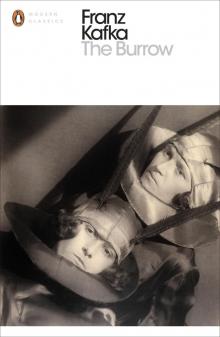 The Burrow
The Burrow The Castle
The Castle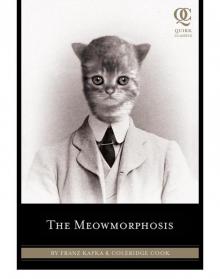 The Meowmorphosis
The Meowmorphosis The Sons
The Sons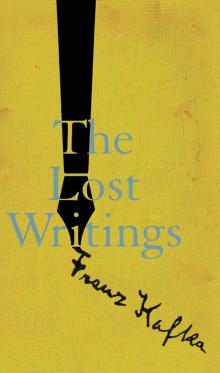 The Lost Writings
The Lost Writings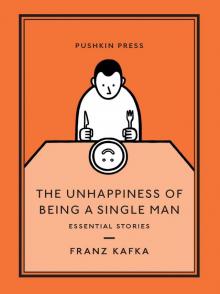 The Unhappiness of Being a Single Man
The Unhappiness of Being a Single Man Amerika: The Missing Person: A New Translation, Based on the Restored Text
Amerika: The Missing Person: A New Translation, Based on the Restored Text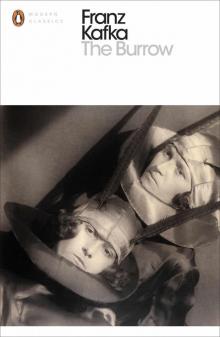 The Burrow: Posthumously Published Short Fiction (Penguin Modern Classics)
The Burrow: Posthumously Published Short Fiction (Penguin Modern Classics) The Diaries of Franz Kafka
The Diaries of Franz Kafka Investigations of a Dog
Investigations of a Dog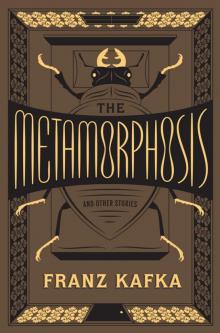 The Metamorphosis and Other Stories
The Metamorphosis and Other Stories The Trial: A New Translation Based on the Restored Text
The Trial: A New Translation Based on the Restored Text